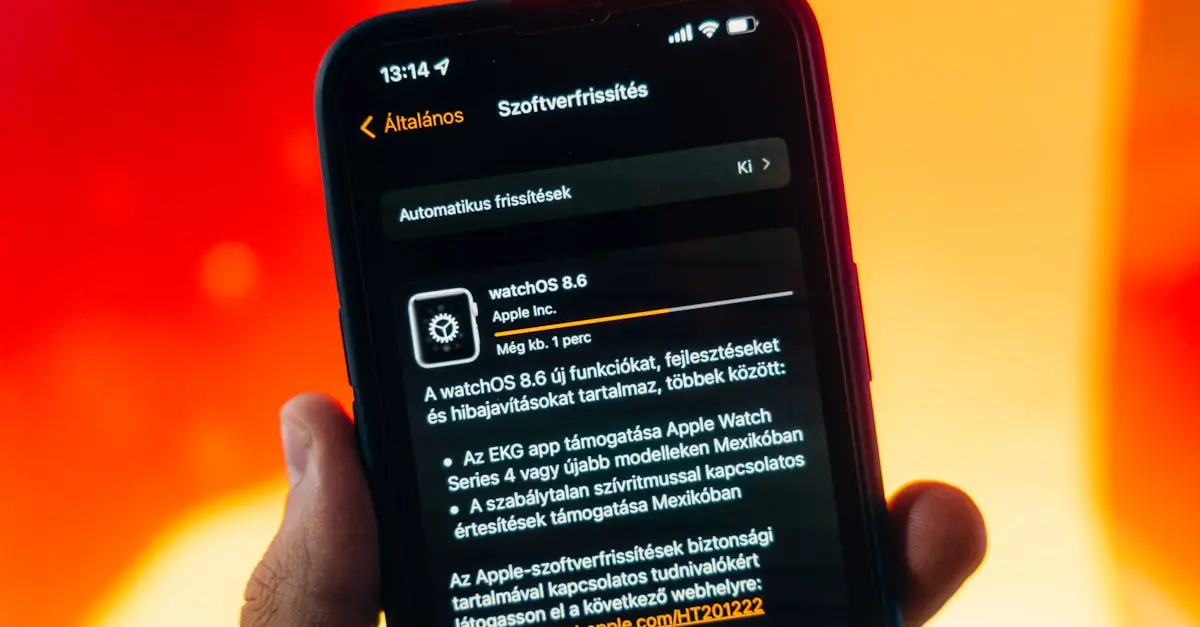In a world where privacy feels like a luxury, the thought of spyware lurking on an iPhone can send shivers down anyone’s spine. Picture this: you’re scrolling through your favorite cat memes, blissfully unaware that someone might be eavesdropping on your every tap. It’s a modern-day horror story that’s all too real.
But fear not! While the idea of someone installing spyware on your iPhone sounds like the plot of a bad spy thriller, understanding the risks can help you stay one step ahead. From sneaky apps to phishing schemes, the digital landscape is filled with potential threats. So let’s dive into this intriguing topic and uncover whether your beloved iPhone is safe from unwanted prying eyes. After all, who needs a secret agent when you can have a little knowledge on your side?
Table of Contents
ToggleUnderstanding Spyware
Spyware poses significant risks to iPhone users, often leading to unauthorized access to private information. Knowledge about spyware and its implications enhances a user’s capacity to safeguard personal data.
What Is Spyware?
Spyware is a type of malicious software designed to gather information from a device without the user’s consent. Its primary purpose involves tracking user activity, collecting personal information, and transmitting it to third parties. Several spyware applications operate silently in the background, making detection difficult. Users might find their calls, messages, and location data exposed due to its stealthy nature.
Types of Spyware
Various types of spyware exist, each with its own distinct features.
- Keyloggers capture every keystroke made on a device, potentially exposing sensitive information like passwords and credit card numbers.
- Adware tracks browsing habits and delivers targeted advertisements, often intruding upon user privacy.
- Trojan spyware disguises itself as legitimate software, gaining access to a device under false pretenses.
- System monitors provide real-time data on user activities, enabling malicious entities to gather personal insights.
Awareness of these spyware types helps users recognize potential threats on their iPhones.
How Spyware Works on iPhones
Spyware operates covertly, gathering sensitive information from an iPhone without user knowledge. Various methods enable the installation of this malicious software.
Installation Methods
Spyware can infiltrate iPhones through several avenues. Malicious apps downloaded from unofficial sources represent one common method. Phishing links, often found in emails or texts, may also trick users into installing spyware. Unauthorized access to a user’s iCloud or Apple ID allows attackers to execute remote installation as well. Jailbreaking an iPhone can expose it to vulnerabilities, making it easier for spyware to take hold. Security gaps in outdated software versions present additional opportunities for attackers to exploit.
Signs of Spyware Presence
Indications of spyware presence may include unexpected behavior on the device. Unusual battery drain often signals the background activity of spyware processes. Apps crashing or running slowly can also point to malicious interference. Users might notice unexpected data usage spikes as spyware transmits personal information. Changes in settings, such as new permissions granted to apps, may seem suspicious. Frequent pop-up ads or strange notifications often indicate adware or similar threats. Regularly monitoring device performance helps users detect these signs early.
Protecting Your iPhone from Spyware
Protecting an iPhone from spyware involves leveraging built-in security features and implementing best practices. Users can significantly reduce risks by being vigilant and proactive.
Security Settings and Features
Adjusting security settings strengthens device defenses. Enable two-factor authentication for iCloud and Apple ID accounts. This additional layer of security helps thwart unauthorized access. Keeping software updated also plays a crucial role, as updates often contain vital security patches. A strong password on the device adds another line of defense. Limiting app permissions prevents unnecessary access to personal data, further minimizing risks.
Best Practices for Safety
Practicing safe browsing habits is essential. Avoid downloading apps from unofficial sources, as these may harbor spyware. Staying cautious with links in emails and messages reduces the chances of falling for phishing attacks. Regularly reviewing app permissions allows users to identify questionable apps. Monitoring battery and data usage for irregular spikes can also detect spyware activity. Finally, resetting the device to factory settings can remove any hidden threats if concerns arise. By following these guidelines, individuals can enhance their iPhone’s security and safeguard their privacy effectively.
What to Do If You Suspect Spyware
Taking swift action is essential if someone suspects spyware on their iPhone. Identifying potential threats can mitigate risks to personal information and privacy.
Troubleshooting Steps
First, check for unusual behavior on the device. Unexpected app crashes, rapid battery drain, or increased data usage might indicate spyware presence. Next, examine installed apps for unauthorized or unfamiliar ones. Delete any suspicious apps immediately. After that, run a security scan using a trusted antivirus app, specifically designed for iPhones. Keeping the device software current is crucial; installing updates can patch security vulnerabilities, providing an extra layer of defense. Users should also reset all settings to factory defaults if signs persist, which can eliminate hidden malicious software.
When to Seek Professional Help
Sometimes, detecting and removing spyware requires professional assistance. If the device continues to exhibit strange behavior after following troubleshooting steps, consulting a tech expert may be necessary. Trusted repair services can offer specialized tools for spyware detection. Users should consider reaching out for help if sensitive information shows signs of compromise. In cases involving serious privacy breaches, seeking legal counsel might also be advisable. Understanding the potential implications of spyware is essential for protecting personal data effectively.
Staying informed about spyware threats is crucial for iPhone users. By understanding how spyware operates and recognizing the signs of infection, individuals can take proactive steps to protect their privacy. Implementing security measures and being cautious with app downloads and links can greatly reduce the risk of spyware infiltration.
If any suspicious activity arises, taking immediate action is essential. Regularly reviewing device settings and seeking professional assistance when needed can help ensure personal data remains secure. Ultimately, a vigilant approach to digital security empowers users to navigate their online lives with confidence.


